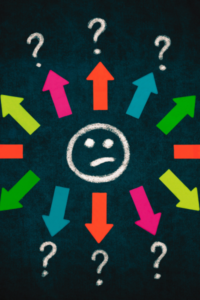Coping in the Age of Confusion

Our times are called many things: the digital area, late-stage capitalism, post-industrial, information age, and many others. I suggest another one: The Age of Confusion.
We live in a confusing world. I’m increasingly seeing this as a feature rather than a glitch of modern society. If things as they are were presented to us in simple terms, we’d see how absurd most of it is. When it’s hard to digest information, it’s more likely that we overlook things and just rubber stamp our approval.
Things That Are Confusing
- Terms of Service
- Advertising
- Politics, economics, and global issues
- Laws, regulations, and bills
- Taxes
- Insurance policies
- Shopping: understanding prices, ingredients, warranties, etc.
- Corporate business structures -who owns what.
- AI – now we have to wonder if even photos and video are real and not deep fakes.
How About Those TOS?
People joke about incomprehensible legal terms for almost any service you use, from mobile phones to online streaming. Does it really has to be this way? There are definite advantages to corporations setting terms that their customers can’t understand.
Not only are TOS incomprehensible, but they are constantly being updated. I feel like I get at least one email per week where a company kindly informs me that their “terms have changed” regarding privacy, billing, or collecting data. As with the original TOS, it’s unlikely anyone actually reads this.
Taxes, Bills, and Laws
It’s almost impossible for anyone who isn’t a tax lawyer or accountant to understand the ever-changing tax laws. Most of us now fill out our taxes online where everything is calculated for us. But most us don’t really understand how these numbers are calculated.
While tax laws are certainly confusing, so are laws in general. Bills voted on by Congress, for example, are often hundreds of pages long. The Hill gives some examples, such as Obama’s Affordable Care Act (over 900 pages), as well as some possible reasons, such as “intense negotiations between Republicans and Democrats.”
Whatever the reason or justification, the fact remains that the average person, and probably even the average lawyer or politician, barely understands many of the laws that govern us.
Shopping
Getting even more everyday, think about shopping at a grocery store. Often, prices seem intentionally confusing. For example, they try to make you buy multiple items with deals such as 2 for $4.99. Does that mean you have to buy two to get this price? You have to read very small print to know the answer.
Recently, many stores are using uneven amounts for prices, such as $2.13 or $4.68. In an age where change scarcely has any value, why don’t they just make everything an even dollar amount? That would be too straightforward. Random numbers are harder to process, especially when customers are in a hurry and buying lots of items. I suspect that the psychology is that odd price amounts prevent us from really knowing what we’re paying.
Using odd numbers for prices is a subtle way to induce a low level of confusion in shoppers. We can obviously understand what the numbers mean. But in a world where we’re looking at millions of data every day, it only takes a small effort to compromise our cognition. It’s analogous to a car with dim, dirty headlights. They are still visible, but on a busy road, a distracted driver is more likely to not see a car with dimmer lights.
Even the old pricing custom of ending most prices with a 9 was itself a way to confuse people. $9.99 is meant to seem cheaper than $10. Most of us automatically convert to the next dollar amount, but the intention is to alter our perception. Using more random numbers is the next phase.
Advertising
The point of most advertising and marketing is to trick you into buying things that are usually lower in quality and higher in price than you’d prefer.
Consider how companies, especially in the US (they are more strictly regulated in many other countries) attempt to fool you into buying unhealthy foods. Foods and beverages are often very high in sugar and sodium, but they try to mask this with misleading labels. Companies are allowed to use generic, healthy-sounding words such as “natural,” “wholesome,” “fresh” (or “farm fresh”), “lightly sweetened,” “real fruit” (it might also have lots of sugar and artificial flavors).
Consumer Reports has a list of misleading food labels.
Who Owns What?
Everyone knows that corporations have all kinds of strategies to save on labor and taxes. They set up operations in distant parts of the world to gain more favorable conditions. From the point of view of the everyday consumer, we often have no idea who we are actually doing business with.
The 10 Mega Companies That Own Everything
10 companies, such as Nestle, CocaCola, Johnson & Johnson, actually own many of the smaller brands we see at the store. Media consolidation is a similar issue, with six companies owning most of what we see, hear, and watch.
There are numerous arguments about the dangers such centralization. Beyond anything else, it’s confusing and deceptive, as monolithic giants hide behind smaller, folksy sounding brands (which actually existed as independent brands years ago).
For example, Disney owns ESPN, ABC, Hulu, Miramax Films, Marvel, Touchstone Pictures, and countless others. Many of these acquisitions are relatively recent, so it’s easy to think of such media outlets as independent if you’re not keeping up with the latest mergers.
Customer Service
It’s getting harder and harder to get help. Many websites now only have chat bots or FAQs rather than live help. Or if they do have live support, it’s like some kind of solve a puzzle game to locate the number or email. Sometimes the easiest way to find a support number is to Google it.
A funny illustration of this was depicted in the program It’s Always Sunny in Philadelphia, Dennis Takes a Mental Health Day (Season 16, Episode 8). Dennis spends half the episode trying to learn how to unlock a rental car and is driven crazy by endless phone trees and hapless customer service reps.
Who Benefits From Confusion?

Society encourages us to be passive consumers. Not only of products and services, but, increasingly, “content.” Information overload is another way that we are overwhelmed into a state of confusion. If we stop to think about things, we might conclude that the world we live in is absurd.
I’m not arguing that every confusing thing in our society was deliberately put there as part of a conspiracy. However, I do think that confusion is functional in a world that’s irrational and out of balance in many ways.
Is There an Antidote to Confusion?
There’s no simple antidote to confusion short of going off the grid completely. But here are some tips that may help.
- When you’re confused, remember that it may not be an accident. Think about who might benefit from your confusion. This may not completely remove the confusion, but it lets you take a step back and say, “Maybe I’m not even supposed to understand this.”
- Shop at stores or websites with transparent pricing.
- Reduce the number of services you use such as streaming channels.
- Accept that we live in fast-paced, chaotic times and that you won’t always be able to do anything about it. To some extent, you can embrace the chaos when you let go of your need to control/understand/manage everything.
- Avoid impulse buying. If you’re not clear about terms or conditions, research them before you make a decision.
- Embrace skepticism and agnosticism about complex and controversial issues. People often pressure you into “taking a side.” Most of the time, you don’t have to do this. In particular, if you can’t do anything about it and it doesn’t affect your immediate future, you don’t have to support or oppose it.
- Reduce your exposure to TV, social media, and other confusion-inducing media.
There’s no simple antidote to confusion. I realize that the above “solutions” are similar to ones you’ve probably seen to reduce stress, simplify your life, cope with ADD, and other self-help topics. Many modern ailments and their antidotes overlap. Such solutions end up sounding simplistic. However, there really isn’t much we can do beyond getting more discerning and centered in our own lives.
